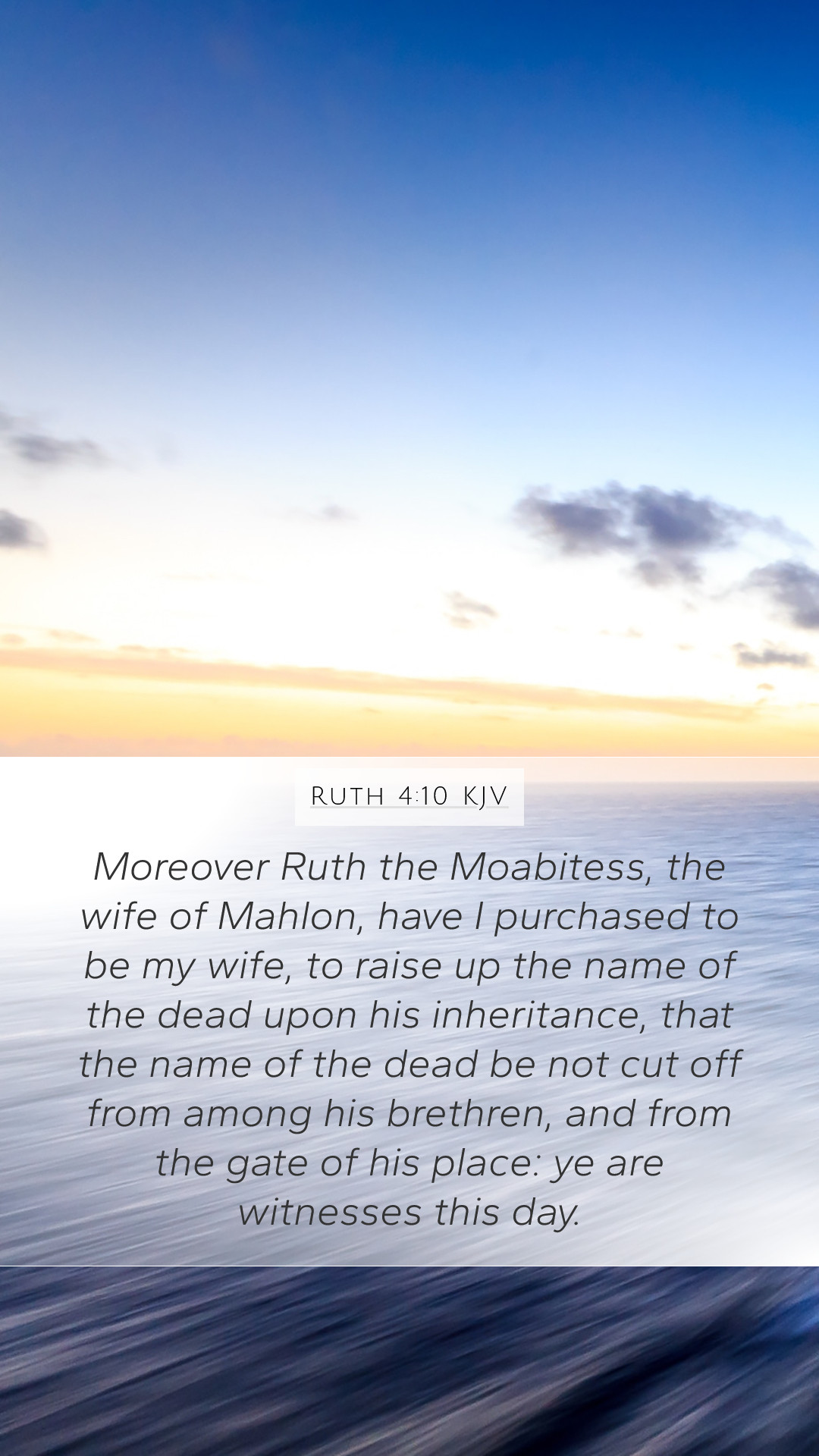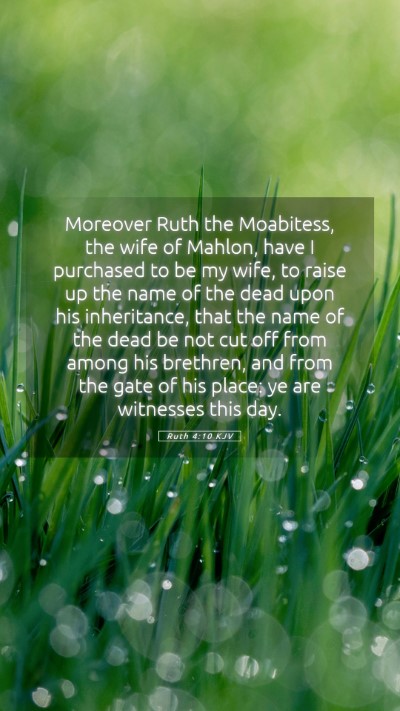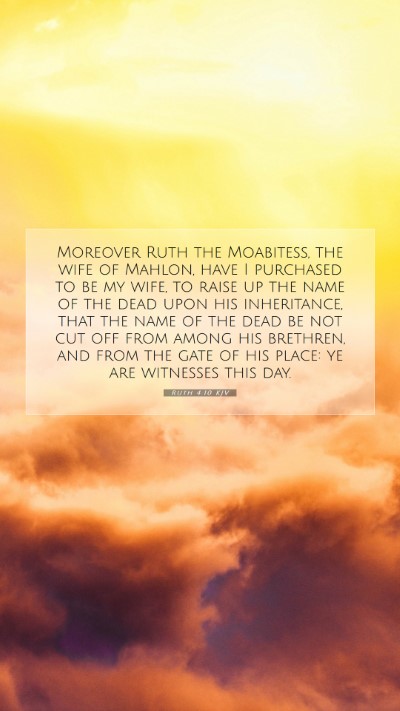Old Testament
Genesis Exodus Leviticus Numbers Deuteronomy Joshua Judges Ruth 1 Samuel 2 Samuel 1 Kings 2 Kings 1 Chronicles 2 Chronicles Ezra Nehemiah Esther Job Psalms Proverbs Ecclesiastes Song of Solomon Isaiah Jeremiah Lamentations Ezekiel Daniel Hosea Joel Amos Obadiah Jonah Micah Nahum Habakkuk Zephaniah Haggai Zechariah MalachiRuth 4:10 Meaning
What is the meaning of Ruth 4:10?
Moreover Ruth the Moabitess, the wife of Mahlon, have I purchased to be my wife, to raise up the name of the dead upon his inheritance, that the name of the dead be not cut off from among his brethren, and from the gate of his place: ye are witnesses this day.
Ruth 4:10 Bible Verse Meaning
Understanding Ruth 4:10
Ruth 4:10 states: "Moreover Ruth the Moabitess, the wife of Mahlon, have I purchased to be my wife, to raise up the name of the dead upon his inheritance, that the name of the dead be not cut off from among his brethren, and from the gate of his place: ye are witnesses this day." This verse encapsulates the themes of redemption, family loyalty, and divine providence.
Bible Verse Meanings
The meaning of this verse can be interpreted through various commentaries. It highlights Boaz’s noble intentions and his role as a kinsman-redeemer, fulfilling the Levirate law found in Deuteronomy 25:5-10.
Matthew Henry explains that Boaz’s purchase of Ruth signifies not only his obligation but his love and intent to perpetuate the name of deceased Mahlon. Boaz's actions reflect a deep commitment to family lineage and honor.
Albert Barnes remarks on the cultural context of this act, emphasizing the importance of maintaining the family name and inheritance among the Israelites. This underscores how seriously they took familial obligations in their society.
Adam Clarke points out the significance of Ruth's inclusion in the genealogy through Boaz, which ultimately connects to the lineage of David and, ultimately, to Jesus Christ, illustrating God’s redemptive plan through these seemingly ordinary lives.
Bible Verse Interpretations
The various interpretations of Ruth 4:10 can be broken down into several key ideas:
- Redemption: Boaz acts as a redeemer, fulfilling God's design for redemption in a familial context.
- Loyalty: Ruth’s loyalty to Naomi is matched by Boaz’s commitment to provide for her and her deceased husband through his actions.
- Legacy: The desire to raise up the name of the dead indicates the importance of legacy and how the actions of one generation affect the next.
Bible Verse Understanding
This verse is central to the narrative arc of Ruth, as it illustrates the completion of a series of events that began when Naomi and Ruth returned to Bethlehem. The understanding of this verse is deepened by its historical and cultural context:
- Kinsman-Redeemer Concept: The kinsman-redeemer, or Goel, concept is an essential part of Israelite law, indicating a relative's responsibility to redeem family members in times of need.
- Women in Lineage: The inclusion of Ruth, a Moabitess, in the lineage of David challenges traditional notions of heritage and demonstrates God’s inclusivity.
- Witnesses at the Gate: The presence of witnesses during Boaz’s declaration highlights the public and solemn nature of the transaction ensuring respect and accountability.
Bible Verse Explanations
The explanation of Ruth 4:10 brings forth the spotlight on the Providence of God that operates through human decisions. Boaz’s willingness to act justly speaks to the moral and ethical standards that are central to the Israelite community:
- Divine Providence: The narrative shows how God orchestrates events for the fulfilment of His promises, providing for Naomi and Ruth in an unexpected way.
- Community and Kinship: Boaz acts not just for his interests but in consideration of the community's well-being, showcasing the harmony between individual actions and societal obligations.
- Moral Integrity: Boaz exemplifies moral integrity, demonstrating that true leadership is rooted in selflessness and accountability to God and community.
Bible Verse Commentary
Commentaries on Ruth 4:10 reveal layers of meaning and practical application for today's believers:
- Faithfulness Rewarded: Ruth's faithfulness to Naomi is rewarded through Boaz's redemption, reflecting God’s providence in our lives when we act in faith.
- Understanding of Redemption: The act of redeeming Ruth serves as a powerful metaphor for the redemption offered through Christ, emphasizing themes of sacrifice and restoration.
- Encouragement for Today: Believers are encouraged to uphold integrity, loyalty, and community values just as Boaz exemplifies in this passage.
Bible Study Insights
This verse can serve as the focal point for deeper Bible study groups or online Bible study sessions exploring themes of redemption, loyalty, and God's providence. Here are some insights to consider:
- Examine the role of women in biblical narratives and their significant contributions to God's redemptive plan.
- Explore the concept of the kinsman-redeemer in the Old Testament and its implications for understanding New Testament redemption.
- Discuss how community witnessing in biblical times parallels today's accountability structures in church and fellowship settings.
Bible Cross References
Ruth 4:10 can be understood in the light of several related scriptures:
- Deuteronomy 25:5-10: The law of Levirate marriage and responsibilities of a kinsman-redeemer.
- Matthew 1:5: The genealogy of Jesus mentioning Rahab and Ruth, highlighting the inclusion of Gentiles in God's promise.
- Isaiah 56:1-8: A prophecy illustrating God's plan to gather the outcasts of Israel, emphasizing the welcoming of Gentiles into His fold.
Conclusion
Ruth 4:10 provides rich theological and moral lessons about redemption, commitment, and God’s providence. By studying this verse, believers gain a deeper understanding of Scripture and its relevance to their lives today.
By considering various aspects such as historical context, cultural implications, and the spiritual insights from renowned commentaries, one can appreciate the profound meaning and enduring significance of this passage in the Bible.


